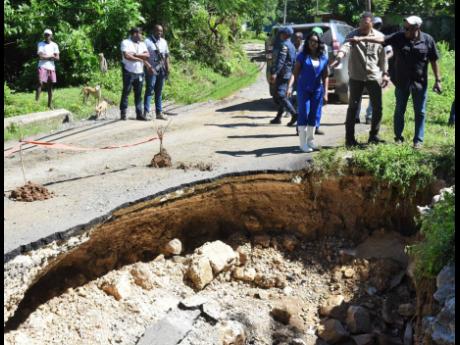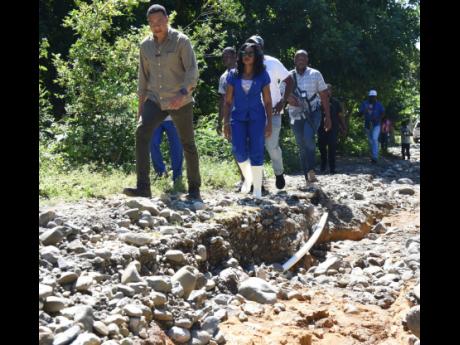‘Creeping destruction’
PM to enforce laws to relocate, block citizens from living in disaster danger zones
Prime Minister Andrew Holness has indicated that his administration will be enforcing legislation to relocate and prevent citizens from settling in dangerous areas that risk life and property whenever there is a disaster.
Speaking during a tour of St Thomas yesterday to assess the damage caused by heavy rains that affected the island last week, Holness noted that the frequency and high intensity of these weather events, induced by climate change, make living in these at-risk areas “a creeping destruction”.
“People have chosen to live on hillsides that are precarious. People have chosen to live very close to river banks, and some even built river courses. We have quite a number of communities which are perched precariously on gully banks,” he said.
According to the prime minister, the Government “has to put its foot down” and enforce the appropriate laws.
“We understand the issues, but for your own safety, you just can’t build in these areas anymore,” he stated.
The Building Act was passed in 2018, but the regulations that would allow for its enforcement are still not in place.
Holness noted, however, that there are other laws under which enforcement can take place.
“There are some areas which we will have to declare. NEPA (National Environment and Planning Agency) also has some responsibility. The parish councils can make declarations as well. So there are many ways in which to control the illegal and unregulated settlements of lands that are in dangerous areas,” he said.
He added that new legislation could also be created.
While he acknowledged that there might be some opposition to the proposal, Holness said that he was relying on the hope that citizens would see that it is in their best interest.
“Once you start to say ‘You have to relocate’, persons are resistant to that. But I think more and more, as they see the regularity with which these events are occurring, that the mindset will change and you will probably see people, on their own, deciding not to build on river courses and or deciding to move,” he said.
“I would use this opportunity to urge Jamaicans, we understand the issues of settlement, we understand the issues of housing and where you can find marginal lands to live on, and so forth, but in seeking to settle, in seeking to find a place to live, take into consideration the environmental issues and the climate-change issues.”
He cautioned that although the recent major weather events have not caused any significant loss of life, “that may not always be the case”.


